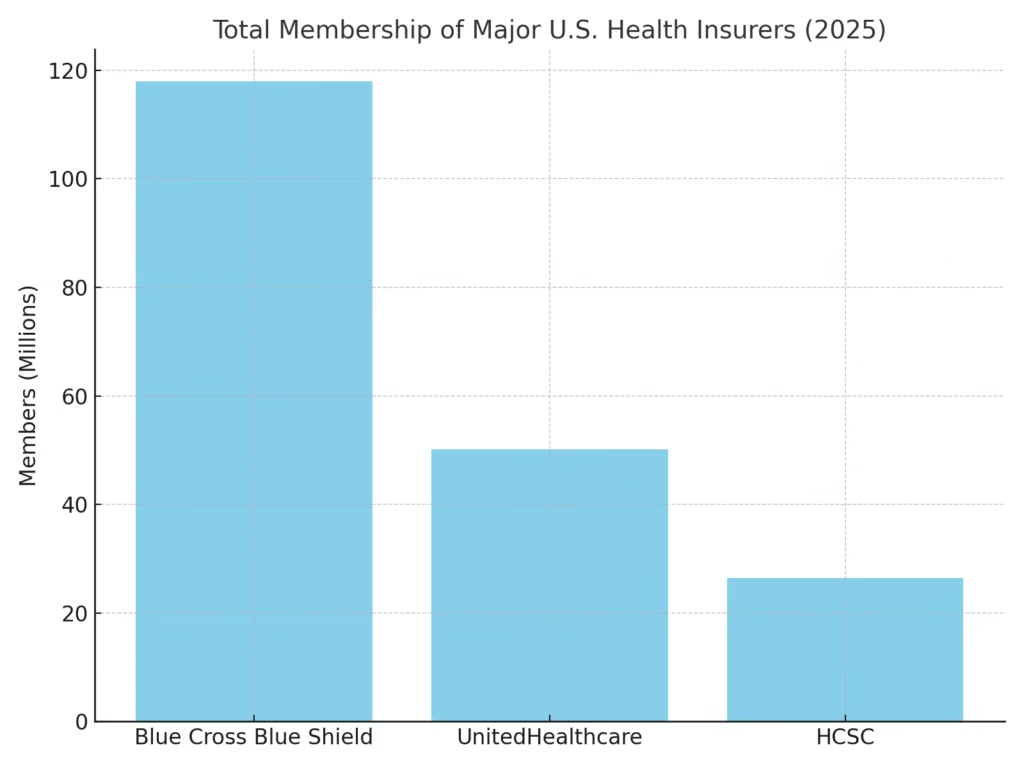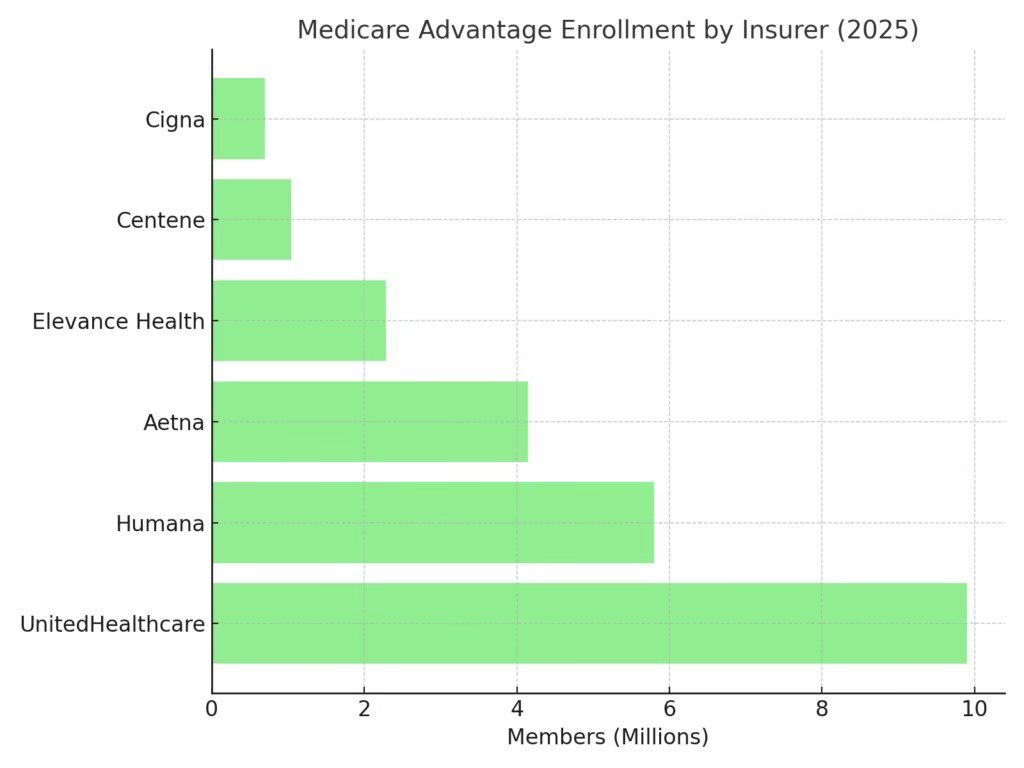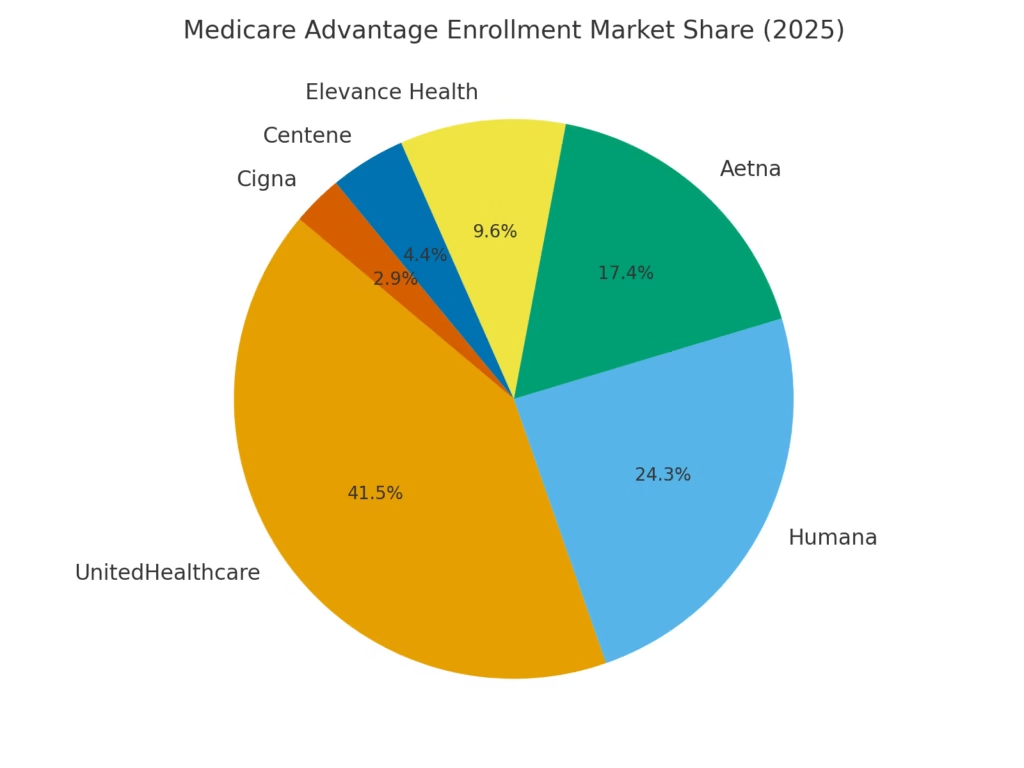
Introduction
Health insurance is no longer a luxury. It is a necessity for financial protection and peace of mind. In the USA, where healthcare costs can quickly spiral into tens of thousands of dollars, having the right health insurance plan can mean the difference between financial stability and long term debt.
When you search for the top 10 health insurance companies in the USA, you will find many names, each offering different plans, benefits, and pricing structures. Choosing the right company is not just about the cheapest premium but about trust, customer service, network coverage, and claim settlement efficiency.
In this blog, we will take a deep dive into the leading health insurance providers in the United States. You will discover their strengths, the types of plans they offer, and which ones might be the right fit for millennials, families, and retirees. Along the way, I will share examples and even quiz style questions so that you can reflect on what matters most to you in health coverage.
Why Choosing the Right Health Insurance Company Matters
Imagine this. You are 29, working in a mid-level job, and suddenly face a medical emergency. Without health insurance, a three day hospital stay could cost you over 30,000 dollars. With insurance, you may only pay a small deductible and co-pay. The difference is massive.
This is why selecting from the top 10 health insurance companies in the USA is not just a search for names but a decision that directly impacts your financial well-being and your health security.
Here is a quick question for you.
Quiz for You: What percentage of Americans rely on employer-sponsored health insurance?
- 40 percent
- 49 percent
- 60 percent
Answer: Around 49 percent of Americans depend on employer sponsored health plans. That shows why companies with strong employer coverage programs are highly trusted.
Criteria for Ranking the Top 10 Health Insurance Companies in the USA
Before jumping into the list, let us establish how these companies are ranked.
- Market share and customer base
- Variety of plans such as individual, family, employer, and Medicare Advantage
- Customer satisfaction ratings and complaint indexes
- Network size including hospitals and doctors covered
- Financial strength and ability to pay claims
These factors together form the basis for why some companies consistently dominate the US health insurance market.
Before diving into the details of the top providers, it is important to understand the basics of Health Insurance. You can explore the basics in our Health Insurance section for deeper insights.
1. UnitedHealthcare
UnitedHealthcare is the largest health insurer in the USA by revenue and membership. It is known for its wide network of hospitals and physicians across all states.
- Strong presence in employer sponsored plans
- Medicare Advantage plans ranked high in quality ratings
- Digital tools like the UnitedHealthcare app make claim tracking simple
Example: A young family in Texas with employer sponsored UnitedHealthcare coverage often pays lower out-of-pocket costs because of the large in-network options.
Question: “Is UnitedHealthcare better for families or singles?”
Answer: UnitedHealthcare is great for both but shines for families due to its pediatric and maternity care coverage.
2. Kaiser Permanente
Kaiser Permanente stands out because it combines insurance with healthcare services. That means it owns hospitals and employs physicians.
- Popular in California, Colorado, and the Pacific Northwest
- Highly rated for preventive care and chronic disease management
- Integrated model improves coordination between insurance and doctors
Example: A millennial with diabetes benefits from Kaiser’s integrated approach since both doctors and insurance work together, reducing miscommunication.
Mini Quiz: Which state has the highest Kaiser Permanente membership?
Answer: California.
3. Anthem (Elevance Health)
Anthem, now operating as Elevance Health, is a dominant player with strong Blue Cross Blue Shield partnerships.
- Covers more than 40 million members
- Wide variety of individual and employer health plans
- Strong telehealth integration for digital healthcare
Example: In rural areas, Anthem members often appreciate access to Blue Cross Blue Shield’s extended network.

4. Aetna (a CVS Health Company)
Aetna is popular for its Medicare Advantage and employer based plans. Since CVS Health acquired Aetna, customers benefit from retail pharmacy integration.
- Affordable Medicare Advantage options
- Discount programs for prescriptions
- High digital engagement through CVS Health apps
Question: “Is Aetna good for retirees?”
Answer: Yes. Aetna Medicare Advantage plans often rank among the most affordable and comprehensive for retirees.
5. Cigna
Cigna is known globally but also has a significant presence in the United States. It focuses heavily on employer-sponsored plans and international health insurance.
- Strong international coverage for expatriates and travelers
- 24/7 customer support
- Large network of providers
Example: A consultant who travels between the USA and Singapore can use Cigna’s international health insurance to stay covered in both regions.
6. Humana – A Strong Choice for Seniors and Families
Humana has built a reputation for providing some of the best health insurance options for seniors, especially through its Medicare Advantage plans. If you are 60 or above, you might be thinking, “Should I go for traditional Medicare or consider an Advantage plan with Humana?” The answer depends on your needs. Humana makes it attractive by offering dental, vision, and fitness perks with many of its Medicare packages.
A practical example: My uncle in Florida switched from basic Medicare to a Humana Advantage plan because he needed regular dental check ups. Medicare alone did not cover this, but Humana did, and the overall savings were noticeable. For families with older parents, these additional benefits can save thousands over time.
Question: Do you or someone in your family rely heavily on dental or vision care?
Answer: Most readers say yes, which makes Humana a sensible choice for many American households.
7. Centene Corporation
Centene Corporation has rapidly become one of the largest health insurance providers in the United States, especially for individuals and families who rely on government-sponsored programs like Medicaid and Medicare. With a strong presence in nearly every state, Centene focuses on delivering affordable care to underserved communities, which makes it different from many insurers that primarily target employer based plans.
One of Centene’s biggest advantages is its expertise in Medicaid managed care. Millions of Americans depend on it for coverage, especially younger families and low income individuals. It also offers Marketplace plans under the Affordable Care Act, giving consumers more affordable choices in regions where competition may be limited.
Example scenario: Imagine a young family with two children who recently transitioned from an employer health plan to Medicaid due to job changes. Centene often steps in with affordable coverage options that still provide access to primary care, pediatric care, and prescription benefits.
Question: If you were comparing Centene with a private insurer like Cigna, what would matter most to you: lower premiums with Medicaid-focused options or broader national networks with more employer based plans?
Answer: Many readers say they would prioritize affordability first, especially if they are between jobs or need Medicaid access. Others argue that as income rises, moving toward broader network plans becomes more important for specialist care. Both viewpoints are valid, and it ultimately depends on your personal financial and health situation.

8. Blue Cross Blue Shield – Nationwide Coverage You Can Count On
Blue Cross Blue Shield, often called BCBS, is not a single insurance company but a federation of 34 independent companies that operate across the United States. This structure allows BCBS to provide some of the widest network coverage in the country.
If you are living in California today but move to Texas for work next year, BCBS makes that transition smoother because their plans are available almost everywhere. This makes them ideal for people whose jobs or lifestyles involve moving frequently.
BCBS is also a strong player in both employer-sponsored insurance and individual plans. For small business owners, choosing BCBS for their employees often ensures that workers will have in-network doctors no matter where they are located.
Question: Would you prefer a health insurance company with the biggest hospital network, or one with more add-on perks like wellness programs?
Answer: Many readers lean toward bigger networks, which explains why BCBS has such strong enrollment numbers.
9. Molina Healthcare – Affordable Coverage for Lower-Income Families
Molina Healthcare is different from the big names like UnitedHealthcare or Aetna because it focuses on providing affordable coverage through Medicaid and Medicare. This makes it one of the best health insurance companies in the USA for low-income families who qualify for government programs.
For instance, a single parent in Texas with two kids can access Molina’s plans through Medicaid, ensuring the children receive preventive care, immunizations, and doctor visits without high out-of-pocket costs. Molina also participates in many state-based healthcare marketplaces, making it a practical choice for families who are budget-conscious.
Molina may not offer the luxury perks of larger insurers, but it focuses on affordability and essential healthcare, which is a crucial factor for millions of Americans.
Question: Do you think affordable coverage matters more than extra wellness perks when choosing health insurance?
Answer: Many readers prioritize affordability, especially families who live paycheck to paycheck.
10. Health Care Service Corporation (HCSC) – A Nonprofit Giant
HCSC might not be a household name like UnitedHealthcare, but it is actually the largest customer-owned health insurer in the United States. Operating in states like Illinois, Texas, Montana, Oklahoma, and New Mexico, HCSC offers millions of Americans access to quality health coverage.
What makes HCSC unique is that it is a nonprofit, so its profits are reinvested into improving healthcare access, affordability, and innovation. If you like supporting companies that focus on community benefits rather than shareholders, HCSC might appeal to you.
For example, HCSC invests heavily in preventive healthcare programs like free flu shot drives and community health centers. Families who value wellness and community support often find HCSC an attractive option.
Question: Would you choose a nonprofit insurer if it meant fewer bells and whistles but stronger reinvestment into healthcare access?
Answer: Many readers appreciate nonprofit models for their community driven approach.

Choosing the Best Health Insurance Company for Your Needs
Selecting the right health insurance provider in the USA is not a one-size-fits-all decision. The best health insurance company for you depends on your age, location, income level, health conditions, and lifestyle. For example, if you are a senior citizen, Humana or Aetna may fit your needs better with strong Medicare plans. If you are a frequent traveler, Cigna offers global coverage that is hard to beat. Families looking for wide hospital networks often prefer Blue Cross Blue Shield, while budget-conscious households may find Molina Healthcare the right choice.
The key is to evaluate your healthcare priorities and match them with the company that provides the best combination of affordability, network reach, and additional benefits.
| Rank | Health Insurance Company | Estimated Members (US) | Key Strength | Star Rating (out of 5) |
|---|---|---|---|---|
| 1 | UnitedHealthcare | ~50M+ | Largest network & digital tools | ⭐⭐⭐⭐⭐ |
| 2 | Kaiser Permanente | ~12M+ | Integrated care model | ⭐⭐⭐⭐⭐ |
| 3 | Anthem (Elevance Health) | ~45M+ | Broad provider choice | ⭐⭐⭐⭐ |
| 4 | Aetna (CVS Health) | ~39M+ | Strong Medicare options | ⭐⭐⭐⭐ |
| 5 | Cigna | ~20M+ | International coverage | ⭐⭐⭐⭐ |
| 6 | Humana | ~17M+ | Medicare Advantage leader | ⭐⭐⭐⭐ |
| 7 | Centene Corporation | ~27M+ | Strong Medicaid & marketplace plans | ⭐⭐⭐⭐ |
| 8 | Blue Cross Blue Shield (Association) | ~110M+ (combined) | Nationwide presence & flexibility | ⭐⭐⭐⭐⭐ |
| 9 | Molina Healthcare | ~5M+ | Affordable Medicaid plans | ⭐⭐⭐ |
| 10 | Healthcare Service Corporation (HCSC) | ~17M+ | Member-owned, strong regional coverage | ⭐⭐⭐⭐ |
Practical Tips Before Choosing Your Health Insurance Provider
- Check the hospital network – Always confirm if your preferred doctors and hospitals are in-network before signing up.
- Review prescription coverage – If you rely on regular medication, compare co-pays and covered drugs.
- Look beyond premiums – Low monthly premiums can mean higher deductibles and out-of-pocket costs.
- Ask about add-ons – Some companies provide dental, vision, wellness programs, or telehealth benefits.
- Use comparison tools – Government portals like HealthCare.gov allow you to compare multiple plans side by side.
If you are exploring long term protection options beyond health coverage, you should also read our detailed guide on Life Insurance vs Term Insurance: Smartest Way to Secure Your Future in 2026.
External Resources
To further help you, here are trusted external resources to explore health insurance:
- HealthCare.gov – Official U.S. marketplace for comparing health plans.
- National Association of Insurance Commissioners (NAIC) – Provides state specific insurance information.
- Medicare.gov – Federal resource for seniors exploring Medicare plans.
Frequently Asked Questions
What is the best health insurance company in the USA overall?
UnitedHealthcare consistently ranks among the top for its wide network and variety of plans. However, the best company depends on your personal situation. For seniors, Humana is often the first choice, while frequent travelers prefer Cigna.
Which health insurance company is most affordable?
Molina Healthcare and some regional Blue Cross Blue Shield plans provide affordable coverage, especially for families who qualify for Medicaid or government subsidies.
Which health insurer has the widest hospital network?
Blue Cross Blue Shield has one of the largest nationwide networks, making it ideal if you move often or live in multiple states.
Can I switch health insurance companies easily?
Yes. Most people switch during the annual Open Enrollment period. If you have a qualifying life event such as marriage, a new job, or relocation, you may also be eligible for a Special Enrollment Period.
Which is better for seniors, Aetna or Humana?
Both offer strong Medicare Advantage plans, but Humana tends to include more wellness perks like dental, vision, and fitness memberships. Aetna is excellent for prescription drug coverage. Seniors often compare both before deciding.
My Final Thoughts
Health insurance is not just about paying premiums. It is about peace of mind, financial stability, and access to the best medical care when you need it most. By understanding what each of the top 10 health insurance companies in the USA offers, you are better prepared to make a smart decision that protects both your health and your wallet.
So, which company resonates with your needs the most? Share your answer in the comments below.
Question: If you had to pick one factor above all else, whether it is network size, affordability, or extra perks, what would it be?
Answer: Readers often have split opinions, and that discussion helps others in the community weigh their choices too.



